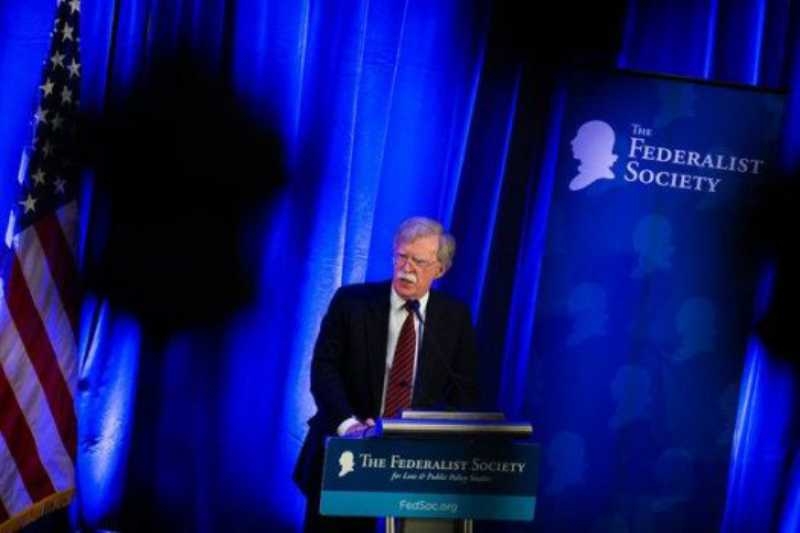Why the ICC should rejoice when America attacks it?
In 2002, John R Bolton, then an undersecretary of state, went after the International Criminal Court. The tribunal had recently been created to prosecute genocide, crimes against humanity and war crimes throughout the world, and apparently he felt that it threatened the United States.
The court was backed by a crowd of zealous activists who believed law should rule over politics, and its flamboyant first prosecutor seemed to think he could outsmart foxy leaders and generals. Bolton responded by coaxing or arm-twisting as many governments as he could into pledging that they wouldn’t hand Americans over to the court. (By one estimate, 95 states have made that commitment.) Sixteen years later, Bolton, now President Donald Trump’s national security adviser, has resumed his onslaught on the International Criminal Court, today 123 members strong.
In a speech before the Federalist Society in Washington, on Sept. 10, he played the court for mismanagement, corruption, inefficiency, and partiality. The ICC, he said, is the American founders’ “worst nightmare come to life.” He had in mind the intention of the ICC’s current prosecutor, Fatou Bensouda, to investigate atrocities committed in Afghanistan, mostly in 2003 and 2004, during the United States-led invasion of the country. American military personnel and American intelligence agents are not Bensouda’s main targets; the Taliban and Afghan security forces are. But some Americans presumably would be vulnerable to prosecution for torture and other acts of cruelty toward prisoners of war. Afghanistan is a member state of the ICC, which allows the court to prosecute major crimes that may have been committed on Afghanistan’s soil since the court was set up. Still, what is there to be afraid of? In his recent speech, Bolton said the ICC was compromised. He said that its first prosecutor had “attempted to protect a high-ranking government official from prosecution, assisted a businessman with links to violations in Libya and shared confidential court documents with Angelina Jolie.” He also mocked the court’s record: “Since its 2002 inception, the court has spent over $1.5 billion while attaining only eight convictions.”
Had Bolton checked his facts he could have been harsher still. By my estimate, the ICC has cost about two billion dollars. And it has tried only five individuals (convicting three of them). “The court has been ineffective, unaccountable and indeed, outright dangerous,” Bolton said. Inefficient and unaccountable, yes. But dangerous? Partly because of the ICC’s inherent defects and its missteps — but also because of a shifting political climate worldwide, including the rise of nationalist and populist governments, which typically are hostile to supranational justice — it now seems nearly toothless. Although President Omar Hassan al-Bashir of Sudan was indicted on a charge of genocide almost a decade ago and the court issued a warrant for his arrest, he still travels internationally, including to ICC member states. Uhuru Kenyatta and William Ruto, the president and vice-president of Kenya, were charged for crimes committed during an eruption of ethnic violence after an election in 2007. But they managed to torpedo those accusations — including, apparently, by intimidating witnesses.
Leaders in Uganda, Ivory Coast and the Democratic Republic of Congo have referred for prosecution before the court opponents from other warring factions, all the while escaping scrutiny for similar crimes they may have committed in the same conflicts. Several African countries have been threatening to leave the ICC, arguing that the court seems to target Africans especially. Burundi already has withdrawn. ICC judges recently ruled that the court has jurisdiction to judge crimes committed in the course of what they called the Rohingyas’ “deportation” from Myanmar last year. Most probably, however, Myanmar’s generals will manage to avoid prosecution as Bashir has, evading an arrest warrant by traveling to friendly countries.
The same day that Bolton made his recent attack, politically sensitive hearings began before the ICC Jordan, the first among the very few Arab states to have joined the court, was defending its decision not to arrest the Sudanese president when he visited the country last year. The Jordanian government claims that a head of state has immunity from such prosecution under international law — an argument that not only goes against the court’s rulings but also fundamentally undermines human rights activists’ quest to end impunity for the most powerful.
To imagine that this court can be a threat to America, the superpower, is farcical. And to treat it as an enemy, as Bolton is doing, may backfire: Kicking it while it down only gives it some of the statures it lacks. There is a smarter if cynical, response available to the Trump administration: the one the Rwandan government adopted with the International Criminal Tribunal for Rwanda, which was set up in late 1994 to try genocide and crimes against humanity committed in the country earlier that year. So long as the court went after the authorities’ enemies, the government cooperated, but in 2002 it balked at the prospect that the ICTR might indict officers from its army for murdering priests. So it said: We’ll try them ourselves.
A national court took on the case — and in 2008 acquitted two defendants and sentenced two to five years in prison (they were released early). Human rights organizations cried foul, but that was that. So goes the politics of justice. The ICC may act only if national courts fail to do so, and like Rwanda, the American government could simply decide to try its own people. United States courts would likely be more lenient, especially toward military personnel, and guilty pleas could lighten any sentences. Instead, though, the American government is being hostile.
But that may be just the ICC’s luck. Faced with the belligerence of the Trump administration, the court might find renewed support in governments that worry about the threat posed by America itself. Nobody is afraid of the ICC, not even its members. But many think it’s Bolton’s, and Trump’s, America that is outright dangerous.
Related Posts

